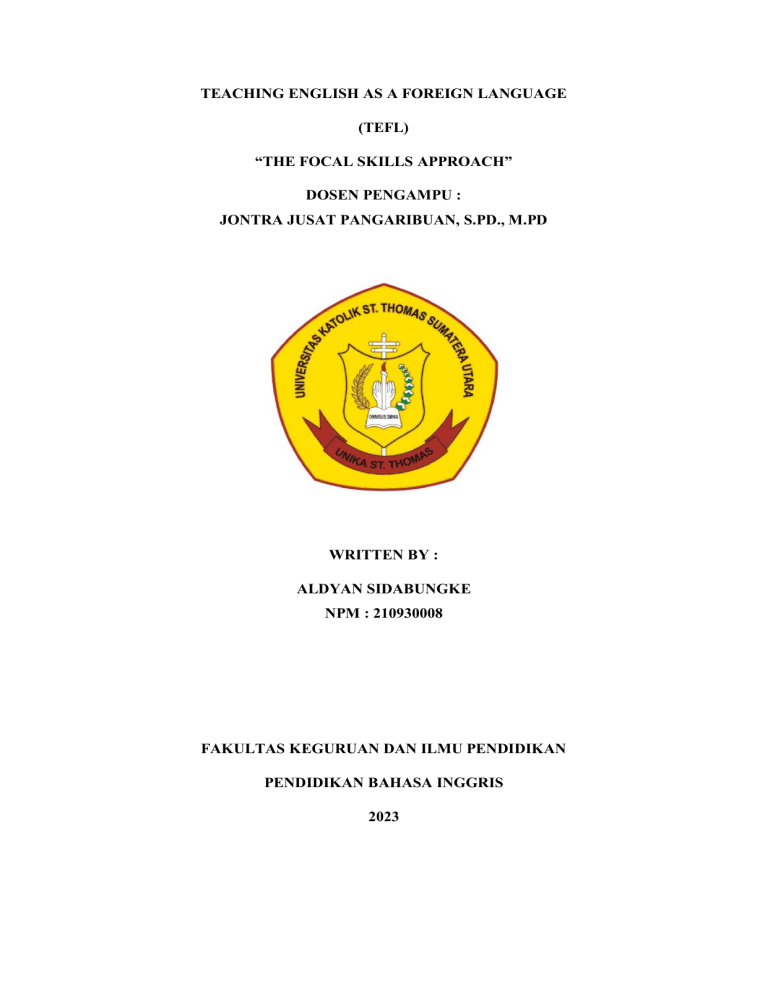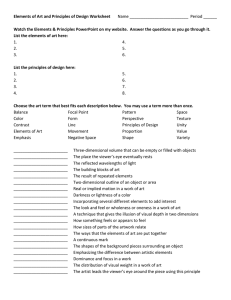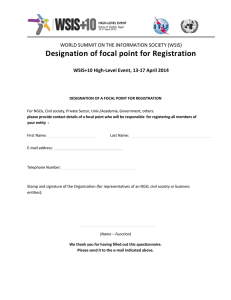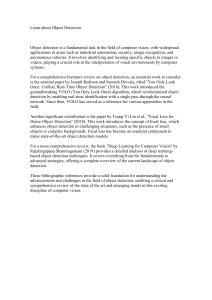
TEACHING ENGLISH AS A FOREIGN LANGUAGE (TEFL) “THE FOCAL SKILLS APPROACH” DOSEN PENGAMPU : JONTRA JUSAT PANGARIBUAN, S.PD., M.PD WRITTEN BY : ALDYAN SIDABUNGKE NPM : 210930008 FAKULTAS KEGURUAN DAN ILMU PENDIDIKAN PENDIDIKAN BAHASA INGGRIS 2023 TABLE OF CONTENT CHAPTER I ......................................................................................................................................... 3 INTRODUCTION ................................................................................................................................. 3 CHAPTER II ........................................................................................................................................ 6 THE EXPERTS ..................................................................................................................................... 6 CHAPTER III ....................................................................................................................................... 8 CONCLUSION ..................................................................................................................................... 8 REFERENCES ...................................................................................................................................... 9 CHAPTER I INTRODUCTION 1.1 Introduction to Focal Skills Focal skills or focal abilities are special skills or abilities that are central or heavily stressed within a specific context or discipline. These abilities are frequently required for success in that setting, and they are the primary focus of training or growth. In educational context, focal skills is a non-traditional program design and evaluation regime that arranges intense foreign or second language training to coincide with student-centered, communicative, skills-focused, and content-based language teaching. The specific focal skills can vary widely depending on the field or domain. The phrase "focal skills" emphasizes the idea that there are distinct core talents that individuals must build and excel in order to achieve success or expertise in any given topic. These abilities are frequently developed through practice, training, and ongoing progress. The Focal Skills program design restructures program design by sequentially focusing attention on the development of one language skill area at a time until its mastery to a chosen threshold level is reached. Assessments in Listening, Reading, and Writing are used to determine whether the threshold level has been attained. (Fakültesi et al., 2010) Teaching practices in Focal Skills programs are heavily influenced by the work of Stephen Krashen. There is an emphasis on comprehensible input using authentic materials. Activities that would raise a student's affective filter are generally avoided. The Focal Skills Movie Technique is an example of the kind of teaching used in this approach. The technique uses authentic movies to bring an immense variety of meaning into the classroom. By narrating and paraphrasing at the appropriate level of complexity, the teacher can create a rich stream of comprehensible input that is directly related to what the students are seeing and hearing. The Focal Skills program model was first implemented at the Intensive English as a Second Language Program at the University of Wisconsin–Milwaukee and later adopted, in whole or in part, at other intensive programs, including the English Language Programme at the United Nations. Research indicates that students in focal skills programs acquire English language proficiency faster than students in most other types of Intensive English Programs (IEP). A number of studies have found that Focal Skills students gain about 35% more English ability in a semester than other Intensive English Program students. The Focal Skills modular system places students in the major language skill areas of Listening, Reading, and Writing according to their assessed skill level and allows them to master each skill before moving on to the next. Each progressive skill incorporates the previous skill for maximum learning potential. The Focal Skills approach is designed to prepare students to successfully pass a TOEFL or other equivalent exam and enable them to move on into college level work by using authentic material and dynamic teaching techniques. In summary, Focal Skills is a program design and assessment regime that structures intensive foreign or second language instruction to align with studentcentered, communicative language teaching that is skills-focused and content-based. The program design restructures program design by sequentially focusing attention on the development of one language skill area at a time until its mastery to a chosen threshold level is reached. The teaching practices in Focal Skills programs are heavily influenced by the work of Stephen Krashen, and there is an emphasis on comprehensible input using authentic materials. The Focal Skills modular system places students in the major language skill areas of Listening, Reading, and Writing according to their assessed skill level and allows them to master each skill before moving on to the next. 1.2 Kinds of Focal Skills The focal abilities required vary substantially depending on the setting, field, or discipline in which you are interested. There is no single group of professionals who specialize in "focal skills" in general. Instead, you'll find specialists in specific topics or sectors who are well-known for their knowledge in specific abilities. Here are some examples of focal skills in general context : a. In Sports Focal skills in sports might include techniques like shooting in football or basketball, serving in tennis, or also dribbling in football. These skills are crucial for athletes to excel in their respective sports. b. In Education In education, focal skills could be the fundamental skills taught in early education, such as reading, writing, and basic mathematis. These are considered foundational for further learning. c. In Music There is focal skills in music. For a musician, focal skills may involve mastering an instrument, understanding music theory, and developing skills or composition and improvisation. d. In Computer Programming Coding and problem-solving skills are often the focal skills in the field of computer programming. e. In Cooking Knife skills, understanding flavor profiles, and basic cooking techniques are focal skills for a chef or someone interested in culinary arts. CHAPTER II THE EXPERTS 2.1 Experts’ Opinion The setting, field, or discipline in which you are interested substantially influences your focal talents. There is no single expert group that specializes in "focal skills" in general. Instead, you'll find specialists in specific subjects or regions who are well-known for their knowledge of specialized abilities. Here are a few examples of professionals in focal skills. 1. Howard Gardner The first point refers to Howard Gardner's expertise in the field of psychology, specifically his theory of multiple intelligences. Howard Gardner is a well-known psychologist and educator who proposed the theory of multiple intelligences, which calls into question the traditional notion of intelligence as a single, general cognitive ability measured by IQ tests. (Gardner, H. (1983) Gardner's multiple intelligences theory proposes that there are several distinct types of intelligences, each representing a different set of cognitive skills or abilities. Linguistic, logical-mathematical, spatial, musical, bodily-kinesthetic, interpersonal, intrapersonal, and naturalistic intelligences are among them. Gardner's theory is based on the idea that people have varying degrees of these various intelligences and can excel in different areas. (Gardner, H. (1983) 2. Noam Chomsky He is a highly influential linguist known for his pioneering work in linguistics, particularly in the fields of language acquisition and generative grammar. Chomsky's work on language acquisition has profoundly influenced our understanding of how humans learn language. He proposed the theory of "universal grammar," which holds that humans are born with an innate linguistic capacity that allows them to naturally acquire language. According to Chomsky's theory, certain linguistic structures and rules are shared by all languages, and children learn a language by adapting to the linguistic input they receive. (Chomsky, n.d.) 3. Stiven Pinker Steven Pinker is a well-known cognitive psychologist and linguist who specializes in psycholinguistics, language, and cognition. His research focuses on the relationship between language and the human mind, shedding light on how language is processed and acquired, as well as how it influences human thought and behavior. (Steven Pinker, 2008) Pinker's research focuses on the relationship between language and cognitive functions. He has investigated how language shapes thought and how linguistic structures influence cognitive processes. His work challenges conventional wisdom and emphasizes the importance of language in shaping our understanding of the world. (Steven Pinker, 2014) 4. John Wells John Wells, another well-known phonetician and author, has made significant contributions to the field of English phonetics and pronunciation. His publications and research have had a significant impact on pronunciation understanding. (Roach, n.d.) John Wells' research focuses on the phonetic aspects of the English language, such as sound pronunciation and accent variations. (Baker_ann_ship_or_sheep_an_intermediate, n.d.) 2.2 Examples 1. Vowel Pronunciation A key focal skill is accurate vowel pronunciation. Vowel sounds differ between languages, and mastering the correct vowel sounds in a target language is critical for clear and natural-sounding speech. In English, for example, distinguishing between short and long vowel sounds such as the /i/ in "seat" and the // in "sit" is critical for understanding. 2. Consonant Pronunciation Consonant sounds, such as // in "think" or /z/ in "zebra," are focal sounds. Producing and distinguishing consonant sounds correctly is essential for understandable pronunciation in English and other languages. 3. Linking and Connected Speech Understanding and using linking and connecting speech is a central skill. Words are frequently linked together in the speech of many languages, including English. For example, in the sentence "I don't know", the "t" in "don't" is often pronounced like a flapping sound and the words come together, an essential skill for natural pronunciation and fluently. CHAPTER III CONCLUSION 3.1 The Conclusion The term "focal skills" is not a widely recognized concept in the field of linguistics or pronunciation instruction. Therefore, there is no established conclusion or specific sources related to this term. But in this topic, I discuss about Focal Skills in Pronunciation. The conclusion that we can take from it is When practicing pronunciation, students often focus on specific skills such as vowel and consonant sounds, stress and intonation patterns, and connected speech to improve their overall speaking ability. Improving these focal skills can improve one's ability to communicate effectively in a second language significantly. It is critical to practice and receive feedback from experienced language instructors or resources designed to assist students in developing these skills. REFERENCES Chomsky, N. (1965). ASPECTS OF T H E THEORY OF SYNTAX. Cambridge: Fourteenth printing. Gardner, H. (2011). Frames of Mind. USA: Basic Books. Roach, P. (2009). English Phonetic and Phonology A Practical Course . Cambridge: Cambridge University Press. Saldivia, P. M. (2012). Competency Based Education and the Focal Skills Approach. Valdivia: Seminario de Tesis para optar al Título de Profesor(a) en Comunicación en Lengua Inglesa y al Grado de Licenciado(a) en Educación. Tok, H. (2010). TEFL textbook evaluation: From teachers’ perspectives. Educational Research and Review.



